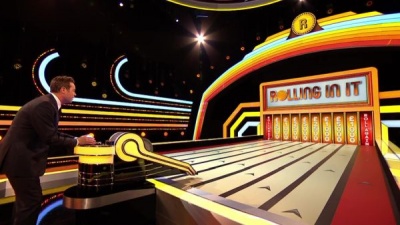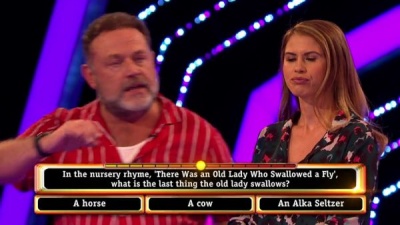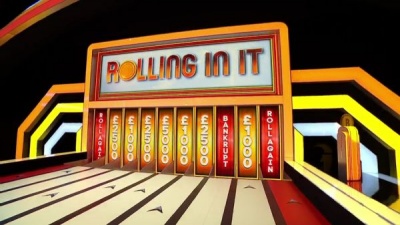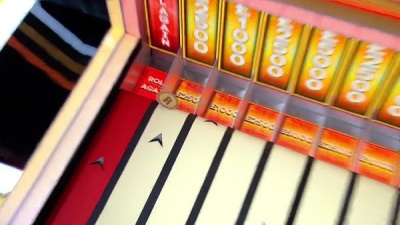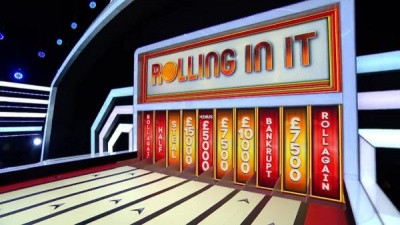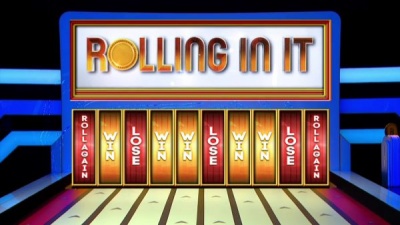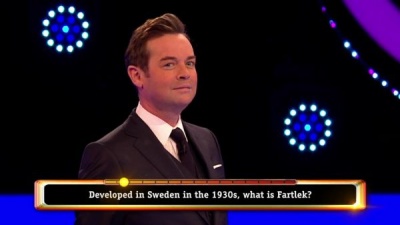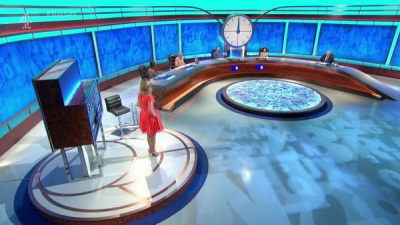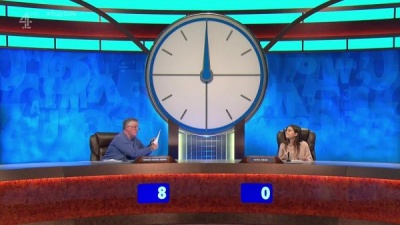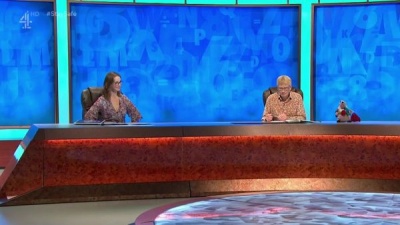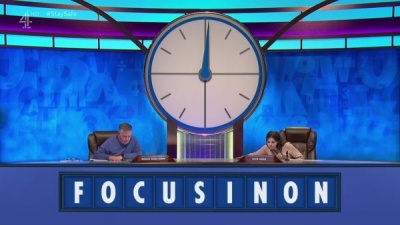Weaver's Week 2020-08-30
Last week | Weaver's Week Index | Next week
This week, we examine a game that's trying to be the new Tipping Point, and succeeding.
Contents |
Rolling in It
Over the Top Productions for ITV, from 8 August
Back in the dim, dark, and distant past, there was an amusement arcade game called "Roll a Penny". You'll insert a coin into a chute, which is slowly oscillating left and right. The coin will land on a number of conveyor belts, slowly moving away from you. If the coin lands wholly on one belt, and doesn't cross any lines, you might win a very modest prize.{1}
After the success of Tipping Point, we like to imagine ITV's directors of game shows went on an awayday to Southend Pier, where they took the train along the pier, played all of the amusement games, chose the ones they liked, sat through the end of the pier show with Joey Essex, and ate so much candyfloss it made their teeth hurt. Southend Pier is so very long, and the directors missed the last train back, which explains why it's taken seven years for ITV to launch another show from the arcades.
Rolling in It is hosted by ITV's most recognisable solo star, Stephen Mulhern. The smartly attired young man has been with ITV for twenty years now, moving from CITV links and Ministry of Mayhem to Magic Numbers, Catchphrase, and the travelling game In for a Penny. Over the years, Stephen's established his space: loud, light-hearted, and safe for absolutely everyone to watch. He's a rare talent, able to turn any show into television magic.
Having said that this game is like Tipping Point, we're now going to describe all of the ways in which it's completely different from Tipping Point. Indeed, the closest resemblances might be 1) the shows are based on amusement arcade games and b) have you ever seen Stephen Mulhern and Ben Shephard in the same room?
Rolling in It is played by couples. There's one celebrity, and one civilian contestant. All of the money they win – if they win anything – goes to the civilian. Throughout the game, we'll hear how two heads are better than one, they can confer and discuss their answers, and hopefully get the questions right.
To show how the machine works, Stephen starts us off by rolling one coin down the machine. Unlike the ones in the arcade, this machine is rigged so that every coin is a winner, it'll land in one of the baskets at the end. You don't have to get the coin precisely in the lane to win. And whichever basket it lands in – be it £1000, £2500, or a cool £5000 – will be given to every team to sweeten their pots. Because of the way the game works, it's rare that any of this money will actually be paid out.
Within the first moments, the show has set itself up: we've met the host and the couples, and seen the machine in action. No messing about, no sense that we've been rushed, it's a superb start to the show.
Backstage, they've "tossed a coin" to determine the order of play. Quite how they do that with three couples is not clear, but then we remember how Stephen Mulhern is a professional magician. The first couple steps forward and we hear a little more about the civilian.
Here's another difference from Tipping Point: on Ben's show, it's question first, machine as a reward. Here on Rolling in It, they fire the coin into the machine first, and then ask questions later.
Why do they do this? The coin might land in an unhelpful basket, coloured red for our convenience. At the start of the game, there's one Bankrupt space, which will wipe out all of the money in the player's pot. Later, there will be more Bankrupts, and some spaces that will simply reduce the money in the pot.
But let's assume that our players have landed in a golden, positive basket. It might be a flat cash amount, it might be a space allowing them to steal another team's money. To win the money, our players need to answer a question correctly.
 Didn't they have this on The Million Pound Drop years ago?
Didn't they have this on The Million Pound Drop years ago?
Yeah, but do you remember the answer?
These are moderately difficult questions, not the gimmees like on other shows. Tipping Point asks easy questions because they want lots of coins into the machine. Rolling in It asks more difficult questions so we can see the players have earned their money. Three answers are offered, at least two are plausible options.
By having two people consider the questions, they can naturally verbalise their thoughts and experiences. Programmes like Eggheads will ask the solo player to deliver a monologue about their answer, and this always feels contrived. A conversation between two people is natural and less artificial.
So our players have chosen an answer from the three on offer. Is it right? Stephen will tell us. He might throw to a commercial break first, he knows we'll come back.
As is traditional in the world of quizzes, a correct answer adds the money to your bank. If you've hit a "Steal" space, the money comes from the opponent. This is done by a glitchy graphic, it counts 1-2-3-4-5-6-7-10. We find this irksome, irritating, a rough edge to improve. And when the glitchy graphic is the most annoying thing about the whole show, they're doing well.
As is traditional in the world of quizzes, an incorrect answer adds nothing to your bank, and passes control to the next team in line. Control also passes if the team rolls into a negative basket, costing them money. The team can choose to pass after they get the question right, or they can play on, the option is up to them.
So it's roll, question, move on. We'll meet all three teams in rotation – Alice will always pass to Bob, who will always pass to Claire, who will always pass to Alice. There are little rituals – one person loads the coin into the roller, the other presses the big flashy button to launch it down the chute. Paul Farrer's music adds tension, without us ever consciously hearing it adding tension.
We'll see a roll every few minutes, each is a little moment of drama. Will this open the door to good fortune, or will it cost them everything? And if fate does decree fortune, will the team prove they are worthy to receive this money, can they answer the riddle posed by the wizard in the sharp suit? Every minute of Rolling in It has some stakes, some tension.
The tension builds through the show. The stakes get higher, the machine changes its slots throughout. More Bankrupt spaces, it gains £10,000 slots, and eventually a £25,000 basket. And there is a natural limit to the programme, it will end immediately after the 15th question has been asked. The questions don't get easier or more difficult as the game goes on, and that feels fair.
After the last question has been asked, one of the couples is in the lead. They're the only ones who will be able to play for their money. {2}. The final round is quickfire questions: each right answer puts a "Win" basket in the machine, each error puts a "Lose" basket in. Play works from left to right, filling in as they go. If the team have time, they can answer further questions to turn "Lose" into "Win".
Then one final coin will determine their fate: £50,000 or more on the roll of a single coin. The tension is ramped up, and the joy on the winner's face is palpable.
Rolling in It is a great game show. The machine is the star of the show, eight lanes of joy and pain. We're taken on an emotional journey, there are highs and lows, ups and downs, moments of tension and relief. We can shout along at the machine, and we can play along with the questions. And we can play along with the metagame: if you're miles ahead and there are two questions to go, dare you pass and hope not to roll again, while risking two chances at a steal?
Stephen Mulhern guides us through this thicket with his trademark skill and expertise. He's calm when he needs to be, frivolous when he can be, and gives that cheeky side-eye when the questions put him in a difficult spot.
We've enjoyed Rolling in It, and it turns out that lots of other people have enjoyed it as well. In its second week out, Rolling in It was the number one game show, ahead of teatime The Chase and The Voice Kids, and leaving BBC1's direct rival Paddy and Freddie Witter On Over Total Wipeout Repeats in the water. We look forward to more Rolling in It.
Footnotes
{1} The game we're discussing is not to be confused with a completely different game of a similar name – the objective there is to land a coin entirely in a square, and win a very modest prize.
{2} The losing couples go home with no prize, this isn't always stated on the show. A tie is possible, but as we've not seen it, we don't know what the tie-break rule is, or even if the producers have written one. Nor do we particularly know why the coins always veer off to the left; is there a logical explanation grounded in physics, or are the coins magically attracted to Stephen Mulhern? More research is needed.
Countdown update
After fourteen weeks of classic episodes, Countdown returned to normal service on 10 August. This came as a relief to many viewers, who like to compete with the programmes on screen: the Championship of Champions and 30th Birthday Extravaganza were of very high quality, and lots of people found they couldn't play along with the AEGROTATS and PLEURITES offered by the top players.
The hiatus happened because it was impossible for players to travel to the Leeds West studios and record new episodes. With the present restrictions, there have been some changes to the studio layout.
Blimey, that's big. Nick has moved away to the right, and there's a slopey bit on the end of his desk we don't recall seeing before. Apparently it's always been there, but out of shot. The slope on the other side was removed, to leave a huge gap between Susie Dent and the guest (for the first episodes back, Dr. Phil Hammond MD).
Little changes for the contestants, who briefly wrote with bold markers until everyone agreed they could read a normal biro at two metres perfectly well. Players hold up their solutions at their shoulder, rather than pass across the table.
Less easy to see are tabletop microphones for the contestants, rather than the mikes on the shirt or top. Dr. Hammond's useful advice to the Countdown viewer often ended up on the cutting room floor: rather than use the slot to give good social messages to 600,000 viewers, Channel 4 insisted that Countdown not mention the you-know-what at all. Mutter mutter public service broadcasting mutter mutter it's not as though they're going to repeat these episodes in 2044.
The one permanent change is to the conundrum. Rather than use eighteen physical tiles, which takes time to prepare, they've used a CGI version of the letters. If it wasn't for the slightly different typeface, no-one would notice the difference.
That's how Countdown has come back from the hiatus. In the actual contest, no-one has yet come close to Luke Johnson-Davies, his octochamp score of 1024 from January still sets the standard for everyone. Ian Volante and Ryan Styles set octochamp marks in the 800s, Phil Hume and David Kempshall a little further back. Current champion Sam Cappleman-Lynes is also going great guns, with three big wins under his belt. Countdown finals week (or fortnight, they've not yet decided) is due to air in December, just one championship for the whole of 2020.
In other news...
The quiet summer is coming to an end. We've heard a test firing of The Strictly Klaxon, the noise to alert us that another celebrity has been named for this year's dancing series. Expect the competitors to be drip-fed from now until mid-September, ahead of the launch in October. It'll be a shorter series this year. Bruno Tonioli won't be judging in the studio until the end of the run – he's prioritising his work on Ballroom With the B-List on the other side of the Atlantic, and will only contribute to our show by video link to the Sunday results programme.
Channel 4's latest excuse not to show episodes of The Crystal Maze: they've got a bridge to sell us. Literally. In Bridge Bother, a dozen hand-picked clueless strangers construct a method of moving from one landmass to another, approximately 250 metres away, without getting their feet wet. Sadly, it's not a three-minute game, the show will last for five weeks, and it'll be filmed in North Wales, alongside Caru Siopa, I'm a Celebrity, and the final of Chwilio am Seren... oh.
Some answers: the old lady swallowed a horse; The X Factor came first; three "really"s; it's an athletic pursuit; and confusion answers the conundrum.
Though there are plenty of new shows coming up, we plan to take next week off while we prepare another big history project. So here's the lineup for the next fortnight.
Got Talent The Finalists comes back to our screens (ITV and VM1, Sun), ahead of the regular series semi-finals (ITV and VM1, Sat 5 Sep).
Rylan has been off our television screens for at least ten seconds, so it's time to bring him back on Supermarket Sweep (ITV, from Tue). New episodes of Tipping Point and The Chase come to daytimes (ITV, from Tue). Pointless continues its summer break until next week (BBC1, Mon 7 Sep), we've also new Pointless Celebrities (BBC1, Sat 5 Sep).
Adam Conover shows how to host The Crystal Maze (Nickelodeon, Fri). Watch and learn, Ayoade. Radio 4 has new episodes of The News Quiz (Fri). Project Z returns to CITV (Mon 7 Sep), and one of the Zeds shambles into the host's seat on Who Wants to be a Millionaire (ITV, from Mon 7 Sep).
And remember Celebrity Game Night from Channel 5? It's got a new home (Comedy Central, Wed), and a new title (Comedy Game Night). Don't forget to miss it.
Photo credits: Over the Top Productions, Yorkshire TV, EBU / AVROTROS.



